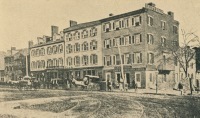Eddie Jones's Blog, page 33
February 11, 2015
Become an LPC Ambassador Bookseller
compensation: Monthly revenue potential of $500 – $2,240+
part-time, telecommuting okay

Lighthouse Publishing of the Carolinas seeks individuals with strong networking skills and a desire to promote “clean” inspirational fiction, Christian Living nonfiction, and devotionals.
LPC Ambassadors are independent booksellers working from home, laptops, tablets, and smart phones. You earn income by selling books online via your own bookstore and by sponsoring in-home book parties through qualified hosts. (Think Tupperware for books). You can also host virtual book parties on Goodreads, Facebook, and Google Hangout. As an LPC Ambassador, you receive:
Initial inventory of print books
Personalized online storefront — (begin taking orders within days)
Domain name registration of your storefront
List of qualified authors prepared to attend book parties and share writing tips and stories with your guests
Complete access to all LPC books (Print, Kindle and Nook versions. Ambassadors earn around eighty cents on every $1.99 eBook . You take the orders – we deliver the books and ebooks to your customers.)
All LPC Ambassadors receive an LPC starter kit, training in social media platform building, client base development, and strategies for generating new sales and book party hosting.
LPC Ambassador benefits:
From your first day as an Ambassador, you earn a 40% commission on every order you sell
As your sales increase, so does your commission rate (up to 50%)
Top-selling Ambassadors may be eligible for cash bonuses, trips, and other prizes
Cash bonuses are available for signing up new Ambassadors
This is not a multi-level marketing scheme.
You earn money by selling books, not buying products or paying fees.
Flexible Schedule, Telecommuting
Salary & Benefits: Commission
January 26, 2015
The Future Isn’t What It Used to Be
Nothing is impossible with God. ~ Luke 1:37 (NIV)
 In 1890 Bishop Wright preached on the impending return of Christ. He said everything God had sent man to do on earth was done. A member of the congregation jumped to his feet and predicted that some day man would fly. The bishop responded with the infamous line: “If God had intended man to fly, he would have given him wings.”
In 1890 Bishop Wright preached on the impending return of Christ. He said everything God had sent man to do on earth was done. A member of the congregation jumped to his feet and predicted that some day man would fly. The bishop responded with the infamous line: “If God had intended man to fly, he would have given him wings.”
When we view the whole of creation, we realize God’s work was indeed good—and incomplete. He did not give us wings with which to fly, replacement parts for failing organs, or antibodies for deadly diseases. His creative work is a beginning; our job is to continue His work by subduing, improving, and imagining what can be from what is not—yet.
Prayer is the way we recognize potential in others. ~ Mark Batterson
When Mary learned she would become pregnant God’s anointed one, she asked, “How will this be?” The angel of God replied, “Nothing is impossible with God.”
You may not see yourself as a prophet, but you are one. ~ Mark Batterson
When we follow God wholeheartedly, we no longer bemoan what was or what isn’t—we anticipate what will be. “The call of God is like the call of the sea,” wrote Oswald Chambers. “No one hears it except the person who has the nature of the sea in him.” This call begins with the transforming work of Christ’s Spirit within us. When we allow Him to lead, possibilities abound.
Thirteen years after Bishop Wright preached on the impending return of Christ, his two sons, Orville and Wilbur, made the first powered flight by man at Kitty Hawk. What impossible task lies ahead of you? Sometimes all that is necessary is to respond with confidence to the task God places before us.
Prayer is the way we write the future. ~ Mark Batterson
(Portions of this post excerpted from My Father’s Business.)
January 5, 2015
Book Sales Representative – Job Opportunities
Book Sales Representative (3 needed)
Lighthouse Publishing of the Carolinas seeks three sales representatives to support our fiction, nonfiction, and devotional books. Book Sales Representatives are responsible for managing and maximizing sales growth within territorial boundaries. This is a commissioned based, work-from-home position.
If you are an avid reader who enjoys talking about books, this may be the opportunity for you!
Book Sales Representative responsibilities:
Sell titles into accounts and actively market direct to consumers
Develop and implement territory strategies and sales plans for assigned titles
Collaborate with LPC marketing team with regards to promotions and specials.
Please apply if you meet the following requirements:
Strong social media and networking skills
Adapt at problem solving
Excellent organizational, written and verbal communication skills
Ability to collaborate with a team and work independently
Proficient in Microsoft Office, especially Word
To apply, please submit your resume and cover letter with salary requirements to jobs@lighthousepublishingofthecarolinas.com.
Indicate “Book Sales Representative” in the subject line. No phone calls/agencies please.
December 29, 2014
Do book ads work?
 At least once a week an author will email me to ask if a specific website is a good place to advertise their book. I often tell them that online ads do not sell books. Ads create book awareness, but reader recommendations remain the primary reason a book sells. A Publisher Weekly review may help make a book known, but it’s those Amazon and Goodreads reviews that cause consumers to click and buy. (Note: a PW review is not an ad and thus carries more clout with readers.)
At least once a week an author will email me to ask if a specific website is a good place to advertise their book. I often tell them that online ads do not sell books. Ads create book awareness, but reader recommendations remain the primary reason a book sells. A Publisher Weekly review may help make a book known, but it’s those Amazon and Goodreads reviews that cause consumers to click and buy. (Note: a PW review is not an ad and thus carries more clout with readers.)
That said, at LPC we have advertised on any number of websites to see if we can find one that provides steady consumers for our books. Here are a few we’ve tried.
The Vessel Project – 4 stars
The good: Price. For around $21, VP will promote your book to their subscriber email list, tweet your ad, mention it on Facebook, and give your ad its own page for the duration of the promotion. (5 days, I think). Each book promotion ad is tweeted at least five times to a following of 30,000 readers for an estimated impression value of 150,000. VP followers may also retweet a particular ad. Add to that the 8,000 VP Facebook followers and you have exposure to close to 200,000 readers. If you’re an author who earns at least $1 per book sold, then you only have to sell twenty-one additional copies to cover the cost of your ad. The owner is responsive – always a plus.
The bad: Your book may not appeal to VP readers. We’ve seen upwards to seventy-five books sold in a day and as few as none. I suggest you subscribe to the VP newsletter, visit a book’s Amazon page the morning the newsletter releases, (8:am), check that book’s sales ranking, and review its ranking later in the day. If you see a noticeable increase in the book’s sales ranking, then take note of the author, genre, number of reviews and stars, and its sale price. That might give you some idea of which books work best for VP subscribers.
In summary: We are pleased with our advertising results on the Vessel Project.
Goodreads Ads – 3 stars
The good: Goodreads ads are great for book branding. I cannot say with certainty that each ad generates new sales for us, but for print copies, we noticed a slight uptick in sales when a book was featured on Goodreads. We normally select a 20-cent per click charge with a $5 daily budget.
The bad: Goodreads ads do not seem to help eBooks. For us, it’s primarily a print book advertising option. As more authors advertise, the less exposure your ad may receive. And if you have multiple books, this can be an expensive way to advertise.
In summary: Goodreads ads seem to create reader awareness. You only pay for clicks, not impressions, so for the money, these ads can be an effective way to get your book in front of readers.
GoodKindle – 2 stars
The good: Price. Each ad is only $19. Each book gets its own page and (so far) that page remains on their website, thus providing an evergreen, SEO affect.
The bad: We tried one book and sold one copy as a result of the ad. Maybe it was the time of year (right before Christmas) but we expected better results.
In summary: The owner of the site responded to our inquiries and that’s always encouraging.
Readers in the Know – 1 star
The Good: You can create an account with up to three books in your account. We took advantage of their 60-day free trail. The latest pricing on their site shows this service is around $30 US dollars. Each additional title (you can list up to three for $30) is around $1.50. The interface was easy to use and the ad ran as scheduled.
The bad: We did not see any increase in sales.
In summary: Maybe we tried this service too soon. I seem to recall the owner was building his business so he may not have had lots of traffic to the site. Still, even $30 for an ad that doesn’t generate any sales is too much to spend.
There are lots of websites that charge to advertise your book. The challenge is finding sites whose ads translate into sales. As a general rule, for ever dollar you spend on advertising you will need to sell one book to cover that expense. My general impression is that the real winners in online advertising are the sites selling the ads.
We’ve tried advertising on Facebook but Facebook has this weird policy that precludes any ad with text that exceeds a certain threshold. (I think it’s around 15% text). Since most book covers have a title, author name, and tagline or quote, our books fall outside of Facebook’s guidelines. (And I’ve yet to see Facebook deliver increase sales for the ads that did meet their guidelines.)
I’ve heard Bookbub is a great place to advertise your book www.bookbub.com/home/ but ad prices range from $55 to $1,700.
If you had success advertising your book online, I’d love to hear your thoughts.
December 6, 2014
Going to See a Man About a Dog – by Mark Twain
Scotch whisky to a Scotchman is as innocent as milk is to the rest of the human race. In Swinton’s case it was a virtue and not an economical one. Twenty-four dollars a week would really have been riches to us if we hadn’t had to support that jug; because of the jug we were always sailing pretty close to the wind, and any tardiness in the arrival of any part of our income was sure to cause some inconvenience.
jug we were always sailing pretty close to the wind, and any tardiness in the arrival of any part of our income was sure to cause some inconvenience.
I remember a time when a shortage occurred; we had to have three dollars and we had to have it before the close of the day. I don’t know now how we happened to want all that money at one time; I only know we had to have it. Swinton told me to go out and find it and he said he would also go out and see what he could do. He didn’t seem to have any doubt that we would succeed but I knew that that was his religion working in him; I hadn’t the same confidence; I hadn’t any idea where to turn to raise all that bullion and I said so.
I think he was ashamed of me, privately, because of my weak faith.
He told me to give myself no uneasiness, no concern; and said in a simple, confident and unquestioning way, “The Lord will provide.” I saw that he fully believed the Lord would provide but it seemed to me that if he had had my experience—But never mind that.
Before he was done with me his strong faith had had its influence and I went forth from the place almost convinced that the Lord really would provide.
 I wandered around the streets for an hour, trying to think up some way to get that money, but nothing suggested itself. At last I lounged into the big lobby of the Ebbitt House, which was then a new hotel, and sat down. Presently a dog came loafing along. He paused, glanced up at me and said with his eyes, “Are you friendly?” I answered with my eyes that I was. He gave his tail a grateful wag and came forward and rested his jaw on my knee and lifted his brown eyes to my face in a winningly affectionate way. He was a lovely creature, as beautiful as a girl, and he was made all of silk and velvet. I stroked his smooth brown head and fondled his drooping ears and we were a pair of lovers right away.
I wandered around the streets for an hour, trying to think up some way to get that money, but nothing suggested itself. At last I lounged into the big lobby of the Ebbitt House, which was then a new hotel, and sat down. Presently a dog came loafing along. He paused, glanced up at me and said with his eyes, “Are you friendly?” I answered with my eyes that I was. He gave his tail a grateful wag and came forward and rested his jaw on my knee and lifted his brown eyes to my face in a winningly affectionate way. He was a lovely creature, as beautiful as a girl, and he was made all of silk and velvet. I stroked his smooth brown head and fondled his drooping ears and we were a pair of lovers right away.
Pretty soon Brig.-Gen. Miles, the hero of the land, came strolling by in his blue and gold splendors, with everybody’s admiring gaze upon him. He saw the dog and stopped, and there was a light in his eye which showed that he had a warm place in his heart for dogs like this gracious creature; then he came forward and patted the dog and said,
“He is very fine—he is a wonder; would you sell him?” I was greatly moved; it seemed a marvelous thing to me, the way Swinton’s prediction had come true.
I said, “Yes.”
The General said, “What do you ask for him?”
“Three dollars.”
 The General was manifestly surprised. He said, “Three dollars? Only three dollars? Why that dog is a most uncommon dog; he can’t possibly be worth less than fifty. If he were mine, I wouldn’t take a hundred for him. I’m afraid you are not aware of his value. Reconsider your price if you like, I don’t wish to wrong you.”
The General was manifestly surprised. He said, “Three dollars? Only three dollars? Why that dog is a most uncommon dog; he can’t possibly be worth less than fifty. If he were mine, I wouldn’t take a hundred for him. I’m afraid you are not aware of his value. Reconsider your price if you like, I don’t wish to wrong you.”
But if he had known me he would have known that I was no more capable of wronging him than he was of wronging me. I responded with the same quiet decision as before.
“No, three dollars. That is his price.”
“Very well, since you insist upon it,” said the General, and he gave me three dollars and led the dog away and disappeared upstairs.
In about ten minutes a gentle-faced, middle-aged gentleman came along and began to look around here and there and under tables and everywhere, and I said to him, “Is it a dog you are looking for?”
His face had been sad before and troubled; but it lit up gladly now and he answered, “Yes—have you seen him?”
“Yes,” I said, “he was here a minute ago and I saw him follow a gentleman away. I think I could find him for you if you would like me to try.”
I have seldom seen a person look so grateful, and there was gratitude in his voice too when he conceded that he would like me to try. I said I would do it with great pleasure but that as it might take a little time I hoped he would not mind paying me something for my trouble. He said he would do it most gladly—repeating that phrase “most gladly”—and asked me how much.
I said, “Three dollars.”
He looked surprised, and said, “Dear me, it is nothing! I will pay you ten, quite willingly.”
But I said, “No, three is the price,” and I started for the stairs without waiting for any further argument.
Swinton had said that that was the amount that the Lord would provide and it seemed to me that it would be sacrilegious to take a penny more than was promised.
I got the number of the General’s room from the office clerk as I passed by his wicket, and when I reached the room I found the General there caressing his dog and quite happy. I said, “I am sorry, but I have to take the dog again.”
He seemed very much surprised and said, “Take him again? Why, he is my dog; you sold him to me and at your own price.”
“Yes,” I said, “it is true—but I have to have him, because the man wants him again.”
“What man?”
“The man that owns him; he wasn’t my dog.”
The General looked even more surprised than before, and for a moment he couldn’t seem to find his voice; then he said, “Do you mean to tell me that you were selling another man’s dog—and knew it?”
“Yes, I knew it wasn’t my dog.”
“Then why did you sell him?”
I said, “Well, that is a curious question to ask. I sold him because you wanted him. You offered to buy the dog; you can’t deny that. I was not anxious to sell him—I had not even thought of selling him—but it seemed to me that if it could be any accommodation to you—”
He broke me off in the middle, and said, “Accommodation to me? It is the most extraordinary spirit of accommodation I have ever heard of—the idea of your selling a dog that didn’t belong to you—”
I broke him off there and said, “There is no relevancy about this kind of argument; you said yourself that the dog was probably worth a hundred dollars. I only asked you three; was there anything unfair about that? You offered to pay more, you know you did. I only asked you three; you can’t deny it.”
“Oh, what in the world has that to do with it! The crux of the matter is that you didn’t own the dog—can’t you see that? You seem to think that there is no impropriety in selling property that isn’t yours provided you sell it cheap. Now then—”
I said, “Please don’t argue about it any more. You can’t get around the fact that the price was perfectly fair, perfectly reasonable—considering that I didn’t own the dog—and so arguing about it is only a waste of words. I have to have him back again because the man wants him; don’t you see that I haven’t any choice in the matter? Put yourself in my place. Suppose you had sold a dog that didn’t belong to you; suppose you—”
“Oh,” he said, “don’t muddle my brains any more with your idiotic reasonings! Take him along and give me a rest.”
So I paid back the three dollars and led the dog downstairs and passed him over to his owner and collected three for my trouble.
I went away then with a good conscience, because I had acted honorably.
I never could have used the three that I sold the dog for, because it was not rightly my own, but the three I got for restoring him to his rightful owner was righteously and properly mine, because I had earned it.
That man might never have gotten that dog back at all, if it hadn’t been for me. My principles have remained to this day what they were then. I was always honest; I know I can never be otherwise. It is as I said in the beginning—I was never able to persuade myself to use money which I had acquired in questionable ways.
Now then, that is the tale. Some of it is true.
November 27, 2014
Building an Army of Gadites
 David was banished. 1 Chronicles 12:1
David was banished. 1 Chronicles 12:1To be kicked off, rejected, turned down … can be a powerful motivator.
I spent most of Little League playing for a county ball team that couldn’t afford uniforms. Some days we couldn’t even afford to field a full team. I played for Bayleaf (a crossroads) because all the sponsored teams (like K-Mart) considered me too small. (By the way, I still won’t shop at K-Mart.)
The coaches put me at catcher. (It helps to be small when the only thing protecting you from a Joey Willett fastball is a baseball mitt the size of a cured ham.) And though I couldn’t hit worth a lick, I could get hit. My batting average stunk, but if I could get plunked – I leaned across the plate, a lot – I could walk to first. From there, I usually stole second and waited for a wild pitch to take third. Sometimes I’d get all the way to home without anyone ever hitting the ball.
I made the league all-star team most years, not because I was good, but because I hustled and refused to quit.
Still do.
I get the impression David hustled and refused to quit, too.
I sense he played with a Louisville Slugger size chip on his shoulder.
As well he should. After all, he secured a victory for Saul over Goliath, played music when the king suffered from a sour spirit, and served as Saul’s army general. His reward?
Saul kicked David off the team.
Most of us have been tossed out or off some club or team. Too often we look at rejection as a setback when, in fact, it may be God trying to turn us towards a new opportunity.
A few months ago Amazon banished my publishing company from their “select” Kindle distribution program. The company’s actions opened my eyes to the dangers of making alliances with “giants” and forced me to seek a new selling model: one based on God’s strategy for victory. Going forward, LPC will advance into the bookselling marketplace with an army of Gadites.
If you are not familiar with Gadites, here is how they are described in 1 Chronicles 12.
Gadites defected to David at his stronghold in the wilderness. They were brave warriors, ready for battle and able to handle the shield and spear. These Gadites were army commanders; the least was a match for a hundred, and the greatest for a thousand. 1 Chronicles 12:14.
A couple of observations:
“Gadites defected.” Gadites are warriors disillusioned by the attitude, methods, and bullying of the prevailing “king.”
“David [had] his stronghold in the wilderness.”Gadites assemble and train in dangerous and wild territory.
“They were brave warriors.”Gadites are not wimps. They expected to fight, bleed, and shed blood.
“Ready for battle.” Gadites arrive prepared to fight.
“Able to handle the shield and spear.” Gadites play offense and defense equally well. They know how to take territory and protect their own.
“Gadites were army commanders.” Gadites are leaders and influencers. For us, Gadites are:
Connectors: They know lots of people and enjoy introducing new authors and books.
Mavens: Maven are information specialist who solve problems – both their own and others. The word maven comes from Hebrew, meaning “one who understands.”
Salesmen: Sales reps are charismatic people with powerful negotiation skills. They are able to persuade others to agree with them.
“The least was a match for a hundred, and the greatest for a thousand.” Gadites advance and capture territory.
My business is book publishing and I am assembling an army of Gadites.
If 100 Gadites each sell 100 copies of a book, that’s 10,000 copies sold.
Difficult? Perhaps. We won’t know until we advance. But if 100 Gadites only sell 10 copies each, we’ll still reach an audience of around 3000. (One book is normally shared with two others.)
If you would like to help sow God’s truth through story … if you would like to promote Christian Living books, devotionals, and help authors find new ways to reach readers, visit lpcbooks.com or drop me an email.
With God’s help, we will vanquish the giants that seek to rule (and ruin) the industry and return the glory to Him.
November 16, 2014
Is There Life After Amazon?
“Lord, is there life after Amazon?”
That’s the question isn’t it? For authors and publishers? If Amazon conquers Barnes & Noble, LifeWay, Family Bookstores, and Books-A-Million, will there remain the freedom to write, publish, and sell novels and nonfiction outside of Amazon?
In July Amazon banished LPC from its KDP Select program. When I asked to be re-admitted, they replied, “We can’t offer any additional insight or action on this matter.” So while our titles continue to appear on Amazon as Kindle eBooks, they are no longer prominently featured or promoted by Amazon.
Thus my question to God: “Lord, reveal to me what you want me to learn from this. Show me the next step for LPC.”
Here are a few insights God gave me this week, followed by my prayers.
David was banished from the presence of Saul. I Chronicles 12:1
“Lord, may you be with us and bless us during our time of exile.”
Some Gadites defected to David. I Chronicles 12:8. The least was a match for a hundred. I Chronicles 12:14
“May the God of our fathers see what has happened to Christian publishing, and send modern-day Gadites to help change the face of publishing. Individuals who are strong in faith, where the least is a match for a hundred.”
Success, success to you, and success to those who help you, for your God will help you. I Chronicles 12:18
“I do not assume this verse of success is for LPC, but if it is your will, please give us success in the marketplace.”
Day after day men came to help. I Chronicles 12:18
“I ask that you send men and women to help LPC grow and reach new markets and more readers.”
Will not God also graciously give [you] all things? Romans 8:32
“Lord, show us a better way. Create opportunities for us outside of Amazon. If the LPC Ambassador Program is your idea, bless it.”
I do not know what will become of book publishing in the wake of Amazon’s growing influence, but the trends remain discouraging. Here are a few recent headlines from the book publishing industry.
Beacon Hill Press Closing – Kansas City-based Nazarene Publishing House, parent company of trade imprint Beacon Hill Press, will shut down on December 1.
Abingdon re-evaluates publishing programs beyond 2015 – Abingdon Press, an imprint of The United Methodist Publishing House, announced Thursday that it is reassessing and realigning its Christian Living and Abingdon Fiction programs as a result of shifts in the industry.
Last week I received word that another popular romance imprint was shutting its doors. Each time a house or imprint contracts, another group of authors looks at the landscape and considers self-publishing with Amazon – a company that demands total loyalty.
Where are our Gadites of our day? Where are those men and women eager to change the face of book publishing? If you feel called by God to rise up and run at the giant, please email me. Together, I believe we can make a difference.
One percent of anything with God by your side is a recipe for success.
(All typ0s are orijinal and copywrited. Any rebroadcast or distribution without the XPress riden permission of the author is just find by me.)
November 12, 2014
“What’s going on in the book publishing business?”
Beacon Hill Press Closing - Kansas City-based Nazarene Publishing House, parent company of trade imprint Beacon Hill Press, will shut down on December 1.
http://www.publishersweekly.com/pw/by-topic/industry-news/religion/article/64411-beacon-hill-press-closing.html
Abingdon re-evaluates publishing programs beyond 2015 - Abingdon Press, an imprint of The United Methodist Publishing House, announced Thursday that it is reassessing and realigning its Christian Living and Abingdon Fiction programs as a result of shifts in the industry. The new strategy results in the departure of Associate Publisher Pamela Clements.
http://christianretailing.com/index.php/newsletter/latest/27313-abingdon-press-re-evaluates-publishing-programs-beyond-2015
Yesterday I received word another popular romance imprint was shutting its doors. I cannot divulge the name. I’m sure you’ll hear soon enough.
And this afternoon Jerry Jenkins announced that he’s shutting down his Christian Writers Guild.
http://www.publishersweekly.com/pw/by-topic/industry-news/religion/article/64715-jerry-jenkins-shuts-christian-writers-guild.html
Meanwhile, LPC continues to advance into the great unknown. Coming soon, a major announcement regarding our new book selling model.
Now this from our friend and author Marianne Jordan.
“WHAT IS ONE QUESTION YOU WISH SOMEONE WOULD ASK YOU IN AN INTERVIEW? Please don’t think about this too long? It can be funny, clever, or serious. Please send me your website info, or anything you want posted. Twitter, FB, whatever. I’ll post it under your answer?”
Email Marianne with your question. Don’t forget your Amazon links, websites, FB, Twitter
October 31, 2014
Dry Bones Publishing
 On the last day of last week’s Novel Retreat at the Ridgecrest conference center (directed by Yvonne Lehman) I mentioned to Ann Tatlock that I should start a new imprint called, Dry Bones Publishing because, as I explained to Ann, “So many books have no chance of surviving in this desert wasteland called book publishing.”
On the last day of last week’s Novel Retreat at the Ridgecrest conference center (directed by Yvonne Lehman) I mentioned to Ann Tatlock that I should start a new imprint called, Dry Bones Publishing because, as I explained to Ann, “So many books have no chance of surviving in this desert wasteland called book publishing.”
I was kidding, of course. Last thing I need is another imprint.
But the trend in book publishing can, at times, appear desolate. Especially when you look at the number of houses that are cutting back, retreating, and pushing authors to self-publish. Okay, enough of the gloom.
What I failed to mention to the conferees on the last day was the word of hope God gave me and that word was: “Go in the strength you have.” The passage comes from the story of Gideon (I think). (The verse is in my prayer journal someplace.) Judges 6:14
Point is, all we can do is respond to God’s call, do our best, and leave the “rest” to Him.
None of us can predict where book publishing will be in six months, much less two years from now. (Two years is about how long it takes to get a book released with a large house). All we can do is write the story God places on our heart, produce the best books we can, promote in ways that glorify Him, and trust He will send rain and sunshine and keep the pests (negative reviewers) away.
In the coming days I hope to announce some exciting ways LPC will expand our print sales. I still believe this is the best time to be a writer. The key is finding your target audience.
If you think of your book as a mega-church, then your goal is to find 5,000 parishioners who share your book’s vision. 5,000 who believe in your book’s message, in you … in a God who comes to the aid of those who went in the strength they had.
That’s enough for now. Time to go watch some football / baseball.
As allways, in-e misstakes associated with this emale are Eva Marie Everson’s fault and shud bee direecter to here.
October 29, 2014
Creative Marketing Ideas For Authors – Damian Wolf
Creative Marketing Ideas For Authors
Doing a job of your dreams is a reward in itself. But doing a job of your dreams and getting paid for it – well, that’s what you’d call a win!
Writers who had the luck to have their work noticed and loved by their target readership had to work very hard and very persistently to get where they are now. Nothing just came to them, be sure of that. Especially not in the world of today where celebrity gossip is much more appreciated than wisdom, literacy and true life substance coming out of a writer’s pen. Anyway, in order to stay hip and trending, writers too need some help from marketing experts. With a little help of marketing agents and a good marketing plan, almost any author will remain one of the brightest literary stars. So, the question is – how does a writer do that?
1. Secure an audience before publishing
In case you are a newcomer and you haven’t been published before, you need to spread the word about your book release as soon as possible. Most writers start out as bloggers. Once they get noticed, their blogs turn into books. Assuming you had quite a readership on your blog, you’ll need to update your followers on novelties in your professional life – be excited to share the news about your book with everyone who is willing to hear it! If you also have a Twitter and Facebook page, along with a Linked-In profile – wonderful! Make your announcement (on several occasions) and wait for everybody else to follow up!
2. Be your own brand
Every author should be a brand for him/herself. This goes for you as well. You need to be that writer who wrote that book. Nobody is interested in plain people and/or contents anymore. You and your work need to be loud. Tricky part is if you work within several genres. If this be the case, it’s advisable you use a different pen name for each genre. Why? Well, it’s like with food – once people are used to eating that chocolate souffle with vanilla icing and they absolutely love it, they’ll probably be reluctant to try it with any other flavor. Not because they aren’t risk takers. They just don’t want to be disappointed. So, stay focused on who you are and who you want to be for your readers. Proper branding is half the job done.
3. ‘Write hard and clear about what hurts’
Oh, you clever little thing! Yes, I did quote Hemingway there and it serves the purpose. Point is, when marketing yourself and your product (this product being (a) book(s)) be clear on the message you want to send, people you want to attract, the idea you want to come-across. What is it about your book and you, and not some other writer’s, that should catch the readers’ attention? Take some time and figure this out. Know exactly who you are as a person, a writer and a presenter. Yet, don’t be terrified of this mission, people that are going to read you are most probably similar to yourself – assuming you love what you write, of course.
4. Understand the market
Once your book hits the press, you’ll have it sold through variety of channels – online as ebooks, in book shops as print, maybe on news stands, in different stores that may align with the theme of your book, etc. Some channels will without a doubt earn you more money than others. So, what you need to do is calculate which channel is most suitable for your genre and the type of audience you wish to attract. Sometimes, direct sales are a win. Other times, Amazon will deliver a much bigger return for your effort, maybe even bigger than your personal author’s web page. Who knows! Well, you will – once you dedicate some time and attention to tracking figures down. Still, knowing where to put your marketing efforts will surely pay off on the long run.
Apart for having all these things mentioned above covered, you need to keep your human side, too. Yes, you are their favorite writer, but you are also their only real link to their favorite fiction and fictional characters. So, talk to your readers, engage with them and always stay polite and patient. Organizing book events, tours, theme gatherings will only score you points! An important thing is – don’t push yourself onto the reader. Wait for them to ask for you!
Damian Wolf is an entrepreneur and wannabe writer. He loves to write about small business, marketing tips and interesting life topics. Damian is also marketing assistant at Cubic Promote, and proud husband and father.




